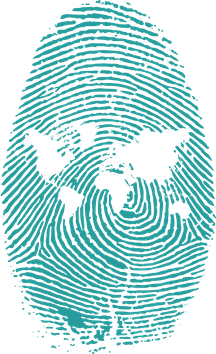The foundation and fundamentals of doing business will always be the same. It’s only the channels and tools that change. With the internet and social media, online advertising is the best way to build your business. These days, you have the ability to reach people from all over the world. You just need the right strategic marketing plan to do this. You need to know your audience, your social media platform, and your product.
Join Andy McDowell as he talks to talented biz builder, public speaker, and social media strategist King Ashley Ann. Learn how to build your business and brand with online marketing tools. Find out how you can get your lead magnet in front of people by leveraging social media. Start building customer relationships today so you can build your way to success.
LISTEN TO THE PODCAST HERE
Social Media: The New Advertising In Today’s Business Environment With King Ashley Ann
THE INTENTION IS THE SAME; HOWEVER, THE METHOD IS DIFFERENT
This is going to be a great conversation. I have an awesome guest with us. Her name is Ashley Ann. She’s in the social media and event planning business. Let me take a few minutes here to share her bio. It’s quite extensive one, but we’re only going to get the tip of the iceberg here with it and let her tell us her story through the rest of it because it’s a very interesting story.
Our guest is Ashley Ann, also known as King Ashley Ann. She is a talented biz builder, public speaker, social media strategist, and award-winning wedding and event designer. Ashley travels the United States speaking to small business owners, side hustlers, wedding and event industry professionals, and those who are thinking about starting a business.
Ashley’s equipped with a BA in Finance and an MBA from the University of Central Arkansas. She is a member of Sigma Gamma Rho Sorority and an avid volunteer. She serves as a teen mentor, direct service volunteer, and domestic violence survivor. She also instructs community financial literacy courses. With that being said, Ashley Ann, welcome to the show.
Thank you for having me. I’m so excited to be here.
That is quite a bio and behind every bio is a story. That’s what we’re all about here on the show, people’s stories. If you wouldn’t mind, take a few minutes to tell our audience about how you got your start. Where does the story start for Ashley Ann on her journey to all these great accomplishments?
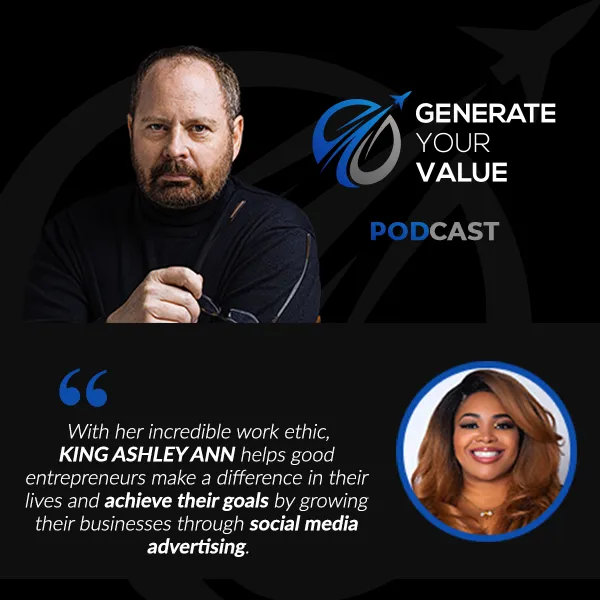
I grew up in the country in a small place called Scott, Arkansas. My grandma would get us up every morning at 5:00. We had to go out and work on the farm, collect the chicken eggs, check the fish nets, and feed the hogs. It was country but it was good. When we were younger, you complain about having to get up all early like that and then you get older and you understand what a wonderful gift you got. It gave me a tremendous work ethic. I haven’t met that many people ever in life that can outwork me and they’re not going to be as consistent.
I grew up and I did everything they tell me to do. You grow up, you go to school, you get a degree, stay out of trouble, and you go and get your corporate job. I did all of that and it still was not working for me. I was working my butt off. Sometimes working 60 to 65 hours a week. I was very responsible with my money. I wasn’t out here being frivolous and even with all of that work and being responsible, I still was barely making ends meet.
I was like, “There’s got to be a better way.” I started paying attention to all of the people that had a life that I aspired to live and a common denominator for most of them was primarily that they own businesses in real estate. I started trying to figure out what I would want to do as far as business and I’ve always been gifted with design. Everyone in my family, all my friends, my family, their friends, and coworkers always would call me to do their parties, to come to help them decorate houses, and stuff like that.
I was in my Master’s program and we had to do a feasibility study on an imaginary business. I talked to myself and said, “This is something that I would like to do.” I said, “I’m going to do my feasibility study on that.” It turns out it was a feasible business. Like a crazy person, I went out and executed my business plan. I booked a few clients. I was still working a corporate job.
Make your feasibility study a feasible business.
Honestly, I prayed to God. I said, “Help me figure out what to do,” and about three days after that, I booked a $150,000 client. From that point on I was like, “Clearly, there’s my sign.” I told them I wasn’t going to renew my contract at the corporate place. I went off full throttle like a crazy person and thank God, I landed on my feet. That’s how I got here.
What grades did you get on your feasibility study?
I got an A.
You weren’t a FedEx that got a big F. The person that founded FedEx got either a D or F on it and look where they are now.
I think that’s because my professor was active in business and he was an active consultant. Because it was someone who wasn’t operating off a theory, someone that had built a business themselves, they look more like, “How do these things apply to real life?”
Scott, Arkansas, what part of the state is that in?
I would say maybe about 30 to 35 minutes or so outside of Little Rock, Arkansas.
What direction?
I guess that would be South like going down towards Keo, Lono, that type of way.
Is it anywhere near Pine Bluff?
It is about 40 or 45 minutes away from Pine Bluff.
I spent a summer between junior and senior year in college in Pine Bluff, Arkansas working in a paper plant.
The smell of that paper plant makes the whole city smell.
If the smell doesn’t get you, the heat will.
It’s hot.
I worked with three engineers and we were knee-deep in the big drier rolls at the end of the process that was drying all the paper. With the big paper, you get all the cellulose and it’s very liquidy and you keep drying it to eventually get all the moisture out of it and it’s paper on the other end. To be in that humid heat in what is already a 90-degree temperature. We went outside at 95 to 100-degree heat to cool off.
It gets humid enough here that you can stand outside and do nothing and start to sweat.
I call it the weather that you wear. People out that aren’t from the South, I’m in Atlanta that don’t know it. You walk outside the grocery store to go to your car and halfway to your car, you’re already dripping it. You’re wearing the humidity. It sounds to me that you didn’t fall into your business. You looked at your passions, maybe your why in life, and what you felt like you were good at to do that feasibility study and eventually go do the business. I inherently feel like you had these designs, these events, they’re already thoughts in your head and your heart.
I did, but until I got into that program and worked on the feasibility study, I didn’t think that I could make a living from it. It forced me to put together the plan, run the numbers, and figure out how many clients I have to get and what I need to charge. I still made some mistakes. Even then, it took me probably three years to get my business to a point where it was profitable. The very first year I was in business, I pretty much had a super expensive hobby. I got a $28,000 ail because I wasn’t charging enough. I fell into that thing where when you’re a new business owner, you just want to work.

You’ll take any job, you’ll take any gig, you don’t have a minimum set and you don’t necessarily have standards and structure for your business. I didn’t have a targeted consumer. I just knew I wanted to work and create. Once you see that number, it slaps you in the face. It slaps you in the right direction. I was like, “Wait a minute, we got to change some stuff.” In the events industry, it starts to become expensive to rent things so you learn pretty quickly that if you’re going to be doing this long-term, you need to start getting your own things manufactured and produced.
I’d probably say that in years 2 through 2.5, I spent pretty much every dime I was making putting it back into the business and acquiring my own inventory. Everything from tablecloths to columns and bars. Whatever I had to rent a lot, I was going to buy it or I was going to get it made because I knew that in the long term, it was going to be profitable for me, which was true. You got to have a little delayed gratification and I know it’s tempting when that money starts rolling in to go ahead and start cashing out and spending it on stuff.
When starting a business, have a little delayed gratification. Don’t start spending once that money starts rolling in
I would tell anyone that’s getting started in a business if you could hold tight and I know sometimes people are in situations and they have to spend it. They need to pay their mortgage. They got to feed their kids but when I started out, I was single. I was more single than a $1 bill and a broke man’s pocket single. I didn’t have kids. I don’t have a man. I can take all my money and all my time. I can take all my efforts and everything and push it toward the business.
That’s a common problem. I have clients that run into the same problem, particularly in a brick-and-mortar store where every person, human being that walks to the door sees the big dollar sign written on the chest. “Here’s an opportunity to bring in some money and revenue.” It’s the thing they fear the most so they’ll say yes to anything to have cash coming in but the reality is that not every customer’s a good customer.
When I’ve seen that, I was like, “We got to put some parameters and say, ‘This is the type of customer that I want to service and the type of client I want to try and get in front of.’” I was intentional in that part of my journey. When it got to the consulting, I would honestly say I fell into that and who knew that it would lead to me being one of the top social media strategies in the country. That’s been crazy but the event design and production company are what taught me. I was good at social media monetization and specifically conversion and building up target audiences.
Colleagues would ask me how I was booking these clients. How was I able to build my business? We had started taking off. I opened up a second location in Dallas. All these people had all these questions that were like, “How are you doing this?” They would bring me in to teach little workshops, seminars, and classes. I was happy to share the information with people. I’m not sure where the corner turned. I just looked up one day and there were lots of people inside my seminars and classes that were not even in the event industry. They were people generally in business getting the information.
There was this one particular woman and I’ll never forget her. She’s pretty nice and she owned an art gallery. We got to be pretty friendly and she would call me now and then at first and eventually, it got to a point where she was calling me 2 or 3 times a week. What was interesting about her was that she had a business manager. She was paying this business manager $5,000 a month. I was still young and in my community. I didn’t know anything about people having business managers, brand managers, and stuff.
She gets to a point where she starts calling me all the time asking me for advice. “What should I do with this? What do you think about this? How would you do this?” One day, I asked her. I said, “Why do you keep calling in asking me stuff? You have a whole business manager over there.” She said, “It’s because everything you tell me works.” Eventually, somebody else came in another person in the industry. He is in lighting and production. His girlfriend was like, “Don’t you know you’re his unofficial business partner? He doesn’t do anything until he calls you.”
That’s when I was like, “If these people are paying these other people thousands of dollars and they’re still calling me, I should be getting paid thousands of dollars.” A few years into the event design and production, I opened up an agency. When I first started, it wasn’t full consulting. I do people’s Facebook ads because I was good at it. I thought I was only doing it. I was like, “This is amazing.”
Around that time, I probably was making about $300,000 a year in profit from running people’s Facebook ads. Eventually a few years in, I understood that I needed to be operating as a consultant. Also, I love teaching other people how to do it themselves. We got into consulting and a few years ago, do you remember this app called Periscope?
I never used it but I remember the app.
When Periscope started, what was cool about them was that anybody could broadcast. You didn’t have to be a politician, you didn’t have to be a celebrity, and you didn’t have to have a big audience. They would let anybody live stream. Around this time, there was this worldwide marketing campaign scam that was going on and they would contact small business owners and they would say, “I can run your Facebook ads for you.” They would charge them thousands of dollars a month to do this. People would max out their credit cards, people would go into their 401(k)s trying to do the right thing for their business.
Back in the day, Facebook, the ads manager was called Power Editor and it was a lot more cumbersome than it is right now. These scammers were counting on the fact that people were ignorant that they did not understand the Power Editor. A lot of people were very intimidated by it. They would go and buy traffic from lower-tier countries. For any of you guys that are reading, traffic is set up in tiers.
For instance, the US, Australia, the UK, and Canada are tier-one countries. We have a stronger dollar and you have customers that are going to be able to come and patronize you where you’re going to be profitable. It keeps going down the scale. What they would do is they would go and put your ad in front of someone in Cambodia or someone in the Philippines. These are people that are nowhere near your business. They’re never going to come near your business, even if you’re selling something digital or online because of the conversion of our dollars. It doesn’t make sense.
They know for a fact that at this point, you don’t understand the Power Editor. You don’t understand how to read the reports, but they know that you see these vanity metrics. Now, you’ve posted something and they said, “I did my job. I got 7,000 people to come over here and view your page. We got 12,000 people to look at your video. It’s not us. We’re doing a great job marketing. It’s you. Your product must suck. No one wants your service.”
You had all these business owners feeling like trash and they were thinking that no one wants my jam. No one wants my tacos or whatever it is that they had to offer. At this point, every day I am hearing a story about somebody that had spent $10,000-plus trusting someone to help them market their business and they had gotten their butts handed to them. They didn’t have the money to pay me or anybody.
I got on Periscope and started teaching for free. I called it Late Night Business because the only time I could get on was late at night because I was busy running my companies. Out of nowhere, my audience exploded. I’m good at reading the wind as the old people would say. I didn’t feel like they were handling Periscope properly. I don’t think they knew what they had and they had some extreme issues with diversity.
I was like, “I’m going to push my people over into Instagram. I’m going to push them all into my private portals.” I probably got out of there about a good two years before Periscope shut down. By then, I had built up probably over 500,000 people on Instagram and I was still doing the same thing. To this day, I still teach for free at least three days a week. I cover everything from business structure and capital to running your ads, building up a target audience, and how to put together your funnel.
I’m trying to help good people that are trying to make a difference in their life trying to accomplish their goals. It’s hard out here. It’s a lot of misinformation out there and unfortunately, the internet has its positives and also its negatives. Because of the internet and social media, it does make it easy for people to get in and pretend to be people that they’re not.
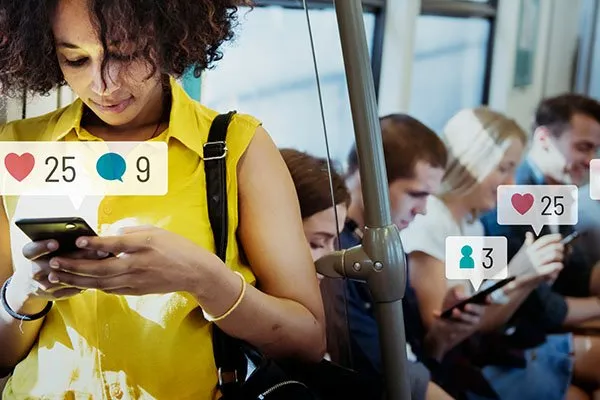
You don’t know enough about what you don’t know. You think you’re making a good decision and you don’t know until it’s too late. I try and hang out here in these social media streets and I tell people all the time, “As long as you got a screen, log in, I’m there. I will teach you for free. You go and execute. If you want to know beyond that, you can purchase a program or a course or whatever it is.” That’s really how all of that started. The event design and production were intentional. The social media was not intentional, it just happened piece by piece.
The internet, like money, is a tool. This is a simple analogy. Hang with me for a second. You got to put a screw in a wall to hang up a picture frame and you decide that you’re going to go to your toolbox and pull out a hammer. It’s a tool and you start banging away at the screw trying to get it in the wall and you end up with this big mess in a big hole in the wall because you didn’t use the tool properly. In this case, you chose the wrong tool, but what you wanted was the screwdriver.
The tool to do the right thing and end up with a nice result. You get these jerks out there that take a tool like the internet like it’s a hammer. They go out there and start hammering away hoping that somebody will join the club. They’re hammering away at people’s wallets making a mess of things as opposed to having integrity, and quality, doing the right thing and making a positive impact on people’s lives. It stinks. You can come up with all kinds of different examples through the history of great tools for life or tools for business and people perverted it.
That’s the thing and that’s why you got to take the good and the bad because the good part about social media is that you’re able to meet thousands of people no matter where you are geographically. It’s easy to create supplemental products, to scale up the business and the marketing is so much more affordable compared to traditional methods. The thing is I always have to remind myself there’s a good and a bad, yin and yang with everything.
The good part about social media is that you’re able to meet thousands of people no matter where you come from.
Everything’s got to be balanced. You got that negative part, but then it’s like, “There are all these positive things that small business owners and aspiring business owners can do. It makes them competitive with a huge company. I remember one of my large clients. They’re a beverage company and they have a very popular soda and they’re all over the world. I worked for this one division and they had a $20 million experimental marketing budget.
They had brought me in under the experimental marketing budget because they wanted to start practicing influencer marketing. I sat there thinking, “You have a $20 million experimental marketing budget for one region, not even for the whole company. This is only for one region and not even the whole United States. This is for one region in the United States and a $20 million experimental marketing budget.” Any of us average business owners, if we have $20 million a year, we are fantastic. Our kids’ kids can live off of what we did.
“You all come over the day after Christmas. We’re having a party.”
This company had mastered mass marketing, but it cannot compete with the ability to build relationships, which is what small business owners have. The internet and social media help you magnify that. These large companies can’t outdo you in that area so this is why they have to rely on influencers, spokespeople, and all of that stuff. That’s very powerful as a small business owner, understanding you have the ability to connect with people. You have the ability to build relationships with them. Thanks to social media, you can do it in a one-to-many model instead of a one-to-one, which allows you to scale your business relatively quickly.
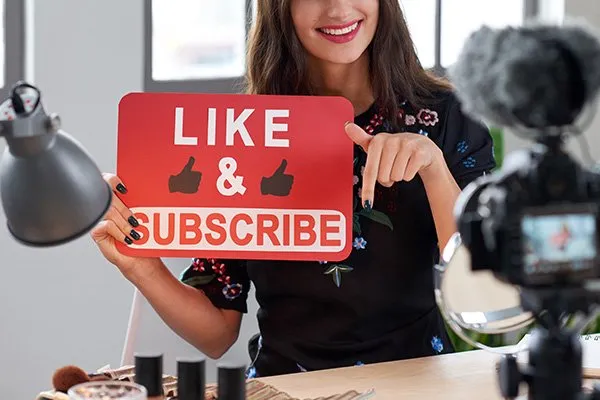
Let’s dive into that a little bit. Let’s talk about social media in general. In your opinion, exactly what is it? Is it a sales channel? Is it a marketing tool? Is it a branding agent? What is it in your opinion or all the above?
I feel like it’s a little all of it.
A, B, C, D, and E with E being all of the above.
It’s got to be E. This is the thing. you make lots of sales through social media, but most of us that are making a lot of money through social media with the exception of if you’re getting paid for viewing content, all build up private communities. We’re able to send text, and emails, have live events, and all those sorts of types of things. That’s where we’re making a ton of our money.
I always tell people to think about social media like they’re at a big party. Depending on what type of kid you were in high school, that’s going to be the social media platform you gravitate towards. If you like Twitter, you probably were a nerd. There is nothing wrong with that. I’m a nerdy girl too. You like to read. You’re down with research. You’re not only going to take what somebody tells you.
That’s my favorite platform. Being an engineering student and whatnot, I was the nerd.
Instagram is all the creative kids. That’s all of us. We like to draw, paint, dance, sing songs, and stuff. You get to go to the Instagram party and hang out with the artsy-fartsy kids. You get Facebook and I would say Facebook is almost like a family reunion. Your grandma and your grandpa are over there. Your uncles and aunts are there or maybe your pastor and first lady. We got to fulfill societal norms but you got a little bit of everybody there.
Pinterest is your crafty kids. Those kids that are always building stuff, always painting stuff, redoing stuff, and stripping stuff. They’re all their own Pinterest. If you start to think about social media like that, it’s like, “What party do I want to go to now? What friend group do I want to hang out with?” It’s a place for you to meet people. It’s the top of your funnel. You’re going to use it for the awareness portion of your marketing. We want as many people as possible to get to know about our brand, our products, your podcast, book, or whatever it is that you have that you’re offering.
I don’t even want you to buy it yet. I want you to know that I exist and I want the opportunity to build a friendship with you and start a relationship. When we think about moving people into our funnel or building up our list, I want your number because I want to be able to call you and text you. I want to be able to hang out a little bit more with you.
In that aspect, I see social media as the top of a funnel like a hyperawareness chamber. I can get out here and meet whomever I want to meet by using different hashtags, by putting out strategic content that solves problems or answers questions, or by little tutorials that show people how to do things. From there, we’re like, “Now that you know about me, do you want to follow me? Even better, do you want to get to know me some more because I want to get to know you some more? Why don’t you join my community? Text me or send me an email.” If people think about it like that, it’ll take a lot of pressure off of them.
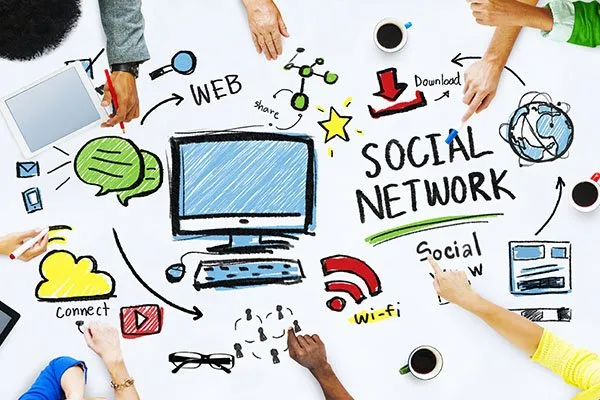
Let’s go down an analogy road here because I love what you said. Let’s pretend we’re back in the 1950s or 1960s and you’re opening up the corner deli in your local town. It’s never existed before, but you go rent a place and buy the equipment and all the meats, cheeses, pieces of bread, and everything else. How is it you’re going to let people know that you’re there? It first starts with a sign.
You go to a sign maker and you put a sign up over the door frame to say, “We’re there.” You then walk a block down the street to the local newspaper and say, “Hi, Mr. Newspaperman. I like to buy an ad.” Why? It’s because I want people to know I exist and I’m in business. I’m going to put an ad in a newspaper because that’s where people can find me because they read the local newspaper.
In two weeks there’s a parade and a festival in town. I’m going to put a booth up on the corner and I’m going to bring some samples of my food and some refreshments. I’ll either give them away or I’ll sell them. I’m going to let people know I exist and this is what I sell. This is the quality of food that I sell. Everything you went through with social media is no different than what we were doing 50 or 60 years ago. We just had different tools.
The sign over the door and the local newspaper. Our market was smaller because we didn’t have the tool or the internet that goes around the world back then but now, we do. As you said, “One tool’s the sign over the door. One tool’s the newspaper down the street. Another social media platform is the tent on the corner where you’re sampling, showing, or demonstrating what you sell. It’s not much different from 50 or 60 years ago. It’s the tools that are a little bit different.
I tell everybody that the foundations and fundamentals of doing business are always going to be the same. I honestly believe that until the end of time, the channels and the tools that we use change. That’s it. Social media is like a big word of mouth. Back in the day before social media, if you made a customer happy, they may have told maybe like their mom, their sister, or maybe a couple of people. Now, if you make them happy, they get on social media and tell all 1,000 of their Facebook followers. If you tick them off, they’re going to tell all 1,000 of their people too. It’s the exact same thing, just a different channel. That’s it.
The foundation and fundamentals of doing business will always be the same. It’s the channels and tools that change.
We live in a more abundant world per se because your reach is so much bigger than a possibility. This show gets read by people in Singapore, India, England, and all around the world because of the power of the internet and going around all over the world. Everything we do from a content perspective here has an opportunity to make an impact on people’s lives around the world because of the tool of the internet, social media, and so forth.
We didn’t have that back in the ‘50 or ‘60, but the theory behind it, the structure behind it, it’s not any different. It’s just on a bigger scale because of what the internet brings to you. I noticed in your bio that you talked a lot about planning a lot of unusual events. Give our audience a little bit of an idea of what unusual events you’ve planned in your days.
Think about anything you can think of to celebrate and I’m not talking about a divorce party. Once we had a scatter party and it’s a version of a celebration of life. There was a young man that had passed away. They wanted to have a cool way to honor him and he was cremated. We found all these little bowls and I had to help his mom put his ashes inside of all the little bowls. We had all his favorite things there. We had hoop dancers and a balloon release. Everybody would come up because he loved to travel and everyone would pick up their bowl and say where they were going to scatter him. That’s very interesting.
On the other side, I do a corporate event and I have girls dressed up in bubbles looking like some type of characters out of a Dr. Seuss book. There are people running around in these giant six-foot balls like pedaling around the party through the pool. We got champagne girls hanging out at the ceiling all because we’re promoting their new drink. I have another weekend and I’m doing a regular old wedding with a couple that’s getting there. It’s a cool job because people have all these different things that they want to promote or celebrate and experience. I’m happy to help them put it together.
Do you feel like you’re naturally a creative person?
I think so. It’s interesting. If I’m honest, I didn’t see myself as creative. Other people told me I was creative and because enough people kept telling me I was creative, I was like, “I’m creative.” Whatever most of us our natural gifts and talents are, because it comes so easy for us, we always automatically assume that everyone else can do them or that it comes easy like that for everyone else even though that’s not true. Externally, people identify it for you. I never once had the thought that I’m creative, but I had so many people telling me that I was creative then I was like, “I’m creative because everyone says I’m creative.”
I went down that journey with photography. As a teenager, I taught myself how to develop my own black-and-white film and do prints. I was the sports photographer for the high school newspaper yearbook and the local paper. I thought it was average until somebody was holding up the mirror and telling you, “No. You’re not average. You’re a very creative person.” It was the same way for me. I developed a skill and it naturally flows for me. I never thought it was a big deal. I’ve had people say, “You need to put the stuff on the internet and sell it because it’s great stuff.”
That’s typically how it is for most people that are gifted. We don’t even think anything about it. Other people are like, “No. You should do something with this.” It’s good sometimes to have other people around you that can recognize your gifts and talents that we may overlook because I feel like it can help push you towards your purpose.
I have a purpose course in which I have those that sign up reach out to close friends with certain questions to hold up that mirror that they can use in helping to develop a purpose statement for their life and themselves. Let me ask you this question to see if you’re of the same opinion as I am. I feel like everybody is creative, but I see it as a muscle that we can work on and develop. It almost creates a flow.
I noticed in my corporate life that I would get in a creative flow because I get in the right mindset and I develop that capability of being able to turn on that quickly and get into a creative mode about a business problem or something of that nature. It didn’t come naturally to me, but I paid attention to it. Whenever somebody tells me they’re not creative, I want to throw the flag on the field, to go, “No. You just haven’t developed it.”
You’re a creative person by nature of being a human being, but you’ve got to sort of develop that muscle to be okay with drawing a picture and then tearing it out of the workbook, crumbling up, and throwing it in the waist paper basket. Start over, try again, and develop that skill and that muscle for yourself. How do you feel about the subject of creativity? Do you feel the same way?
I agree with you, especially when you say it’s the muscle. That’s a good explanation because a lot of us who start with very little become extremely resourceful with our resources and we’ll figure out 10, 20, or 30 different ways to make something happen compared to someone who maybe has a lot of resources at their disposal. They haven’t had to work that muscle as much.
Whatever your gift or your talent, you’re highly creative in that area. It comes easy for you because you can think of 50 different ways to do that. You can think of different ways to get together with different angles, different perspectives, and different ways to look at it. I think all people are creative. We’re creative in different areas and I agree that you got to use the muscle. The more you use the muscle, the easier it’s going to become for you.
I do think that necessity breeds creativity. A lot of the things that I’ve been able to do and accomplish in my life are because I started with humble beginnings. When you grow up in the country, you learn how to make something out of nothing. That’s only a way of life. Your brain becomes a way that you look at everything and attack everything. What else can we do with this?
I asked people, “Did you make dinner?” They said, “Yes.” You are at some level of creativity. I know it’s an old term these days, but did you pull a TV dinner out, throw it in the microwave, cook it, and eat it? “Yes.” On a volume scale, that was maybe a 1 or 2 on creativity, but you were creating an environment and an opportunity to have some sustenance for your body.
You could have gone down to the market and bought all kinds of different meats, vegetables, and cheeses. You sat down and make yourself a charcuterie board and a nice dinner with vegetables, salad, and a glass of wine. It would be creative with your dinner and have a nice experience for yourself in eating dinner.
That’s what I’m talking about when I say creative muscle. You turn that volume switch up to a 7, 8, or 9 by creating that experience for yourself in having dinner. It’s a simple example but try to infuse into people that you are creative. It’s a question of whether you want to be creative and whether you are building that muscle in your life. If somebody was starting a business and knew that social media is going to be important to them, what would be 1, 2, or 3 pieces of advice that you would give them about how to get started?
The first thing I would say is to figure out whom you want to serve. It’s only going to be 1 to 3 groups of people. Everybody is not your customer. When you try to sell to everyone, you sell to no one. They are not here for you. If we can out these 1 to 3 groups of people and learn about them, not necessarily the demographics. Get some general stuff like age range and maybe where they live. If you have an offer that’s gender-based, get that but you need to start to learn what’s their why or what’s motivating them. Where do they hang out? What do they like to eat? Where do they grocery shop?
Figure out who you want to serve. It should only be one to three groups of people. Everybody is not your customer.
The number one rule of marketing is to be where your people are. The more we can learn about them, the easier it’s going to be to put ourselves in front of them so they can learn about us. Once we figure out that target audience, the second thing I would say to figure out is what social media platforms they like to hang out on. A lot of people make the mistake when they get on social media. They try and attack all of the social media platforms. It’s too much. Don’t do that. Go claim your name everywhere so you don’t have to go buy your name from somebody when you get famous for hundreds of thousands of dollars.
You’re going to focus on two social media platforms. The first one is going to be where is your ideal customer hanging out. we need to build and develop that. The second one is, “What’s the social media platform that we gravitate toward the most?” It’s going to be easy for you to be consistent and come up with a strategic content plan. Strategic content is content that attracts an audience to you that will buy. It is going to establish you as a resource and is going to convert for you.
Examples of strategic content are things like terms and definitions, supplies, and showing people how to do something and how to maintain it. Also, giving people real-life behind the scene access, doing frequently asked questions for people, and case studies. If there’s any type of high profile or celebrity case that’s going on or something in the news like hot topics, you can make it relate to what it is that you do. Talk about that from a business perspective. You want to be a resource. Don’t worry about being an expert. Be a resource.
A resource is saying, “This is what I do. This is what I’ve learned and I want to share it with you. If you’re interested in it, hang out with me.” Once we’ve got that, then the third thing I would say is to build a tier-one funnel. It is going to be the easiest way that you can start building up a list and making sales. We’re going to use strategic content, and every day, we’re going to put out a call to action to tell people to get our whatever it is that you have. That’s your lead magnet.
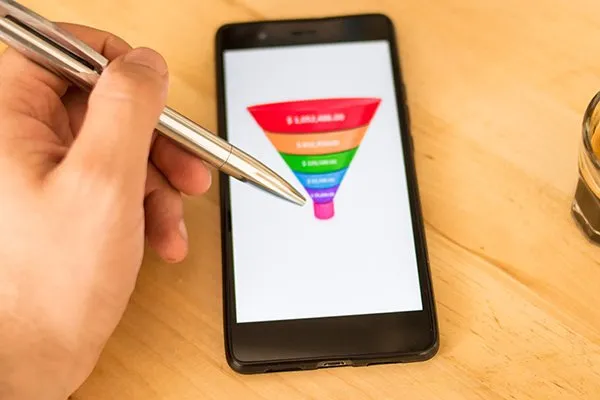
Once they get your lead magnet, it’s going to send them over to a confirmation page and on the confirmation page, you’re going to say, “Your free thing is on the way. It’s coming from this particular email or you’re going to get a text from this number,” or however you have your system set up. From there, you’re going to say, “Watch this short video before you leave.” You’re going to give them a tip on how they can enhance the utilization of this free lead magnet they got from you. You’re going to immediately go into a pain point or desire the client has that correlates with whatever it is lead magnet is.
You’re going to give them a little information. You’re going to say, “If you want to know more about that, you want to dig deeper into it, or you’re ready to get started because you’re a member of my community now, click that button below and grab it at a discount.” We’re going to offer them a discount right then, right out the gate so that way, they know they have the ability to participate with you through purchase. This is great if you’re shy or an introvert because now you don’t have to ask for a sale. That’s the amazing thing about it.
Even if they don’t purchase from you, when they are ready to purchase, they know that you have something to offer. On a regular basis, they can then send you a DM and you can send a follow-up email inside there. In the follow-up email, you can make more extended offers. That’s the best way to get started. It’s the easiest way to make sales without having to be salesy.
You had me at the very beginning when you said to understand their why because I’m a huge proponent of it. We talk about it quite a bit on the show to not only understand our own whys but to also understand other people’s whys. The analogy I use is, “If you know your why, stand on your mountain top like the Statue of Liberty, turn on your light with your why on it, and you’re going to attract people that resonate with your why.”
Your vibe will attract your tribe.
My ears perked up and my eyes got big when you mentioned that in your first point from that perspective. Ashley Ann, I have greatly enjoyed our conversation. We do have one more question left, but before we get to that, if somebody wanted to connect with you and I think you might have a free offering for our readers. What’s the best way somebody can get ahold of you, be part of your community, and maybe have a possibility of a free offering?
Outside of social media, I’m @KingAshleyAnn everywhere. Do you know how we talked about a bunch of muck being out there in the water right now? I have a training and it’s a blueprint for social media sales. This is a very intense training. We’re going to be together for 3 to 5 hours. I do it on a Sunday because if I’m going to show you how to make money on social media, I can’t do it in an hour, but I break down the software and tools you need and how you put things together.
I go deeper about that tier-one funnel and how to set it up and use it to your advantage. If you’re interested in making money on social media, you can go to PlanWithAshleyAnn.com and it’s 100% free. I’m not going to ask you for any credit card information or anything like that. I try and do these trainings at least once a month to make sure people know what it takes to get out here and monetize their social media pages.
I’d encourage you to reach out to Ashley Ann and take your social media, put a rocket engine behind it, and take off on your business because she knows what she’s talking about. I forewarned you in the green room. This was coming because it comes for every guest. There’s no right or wrong answer. It’s about what’s in your heart and those who are regular readers know what’s coming. That question is, “What do the words that generate your value mean to you?”
To me, generating your value is figuring out something you can do in life where you don’t have to trade time for money. It’s about time freedom. How do we create something that not only is self-serving, but we’re able to serve other people and we can do it in a way that we’re not bound by hourly wage? For me, that’s the ultimate generation of your value.
It’s all about service for you, right?
Yeah.
The same for me. People ask me what my why is and I say one word, service. That’s it. I’m looking for all the different avenues through that I can serve my fellow human being and bring positive value to their lives. That’s why I name the company Generate Your Value.
Service works out very well for a lot of us that are doing it. It’s good energy. It’s good karma. It’s good reciprocity. Honestly, I don’t think the mark of a man or a woman is how much you can make. It’s how much you help other people generate a positive impact. I’ve been doing just fine doing that.
Studies have shown that to have joy and happiness in your life, it’s about service. That’s when it truly shows up in a large way, a high magnitude, or whatever phrase you want to put at it when you’re living a life of service. I know your time is valuable. I can’t thank you enough for coming to the show and bringing your golden nuggets. I know is going to make a positive impact on people’s lives, business people’s lives, and so forth.
For you, the readers, thanks for tuning in to this episode. You got more coming your way with terrific people like Ashley Ann to share their stories and bring their value to the world on the airwaves of the internet and make a positive impact. I know your time is valuable. We can’t appreciate you enough for tuning in. Have a great day and week. Keep generating your value in this world. Take care.
IMPORTANT LINKS
ABOUT ASHLEY ANN
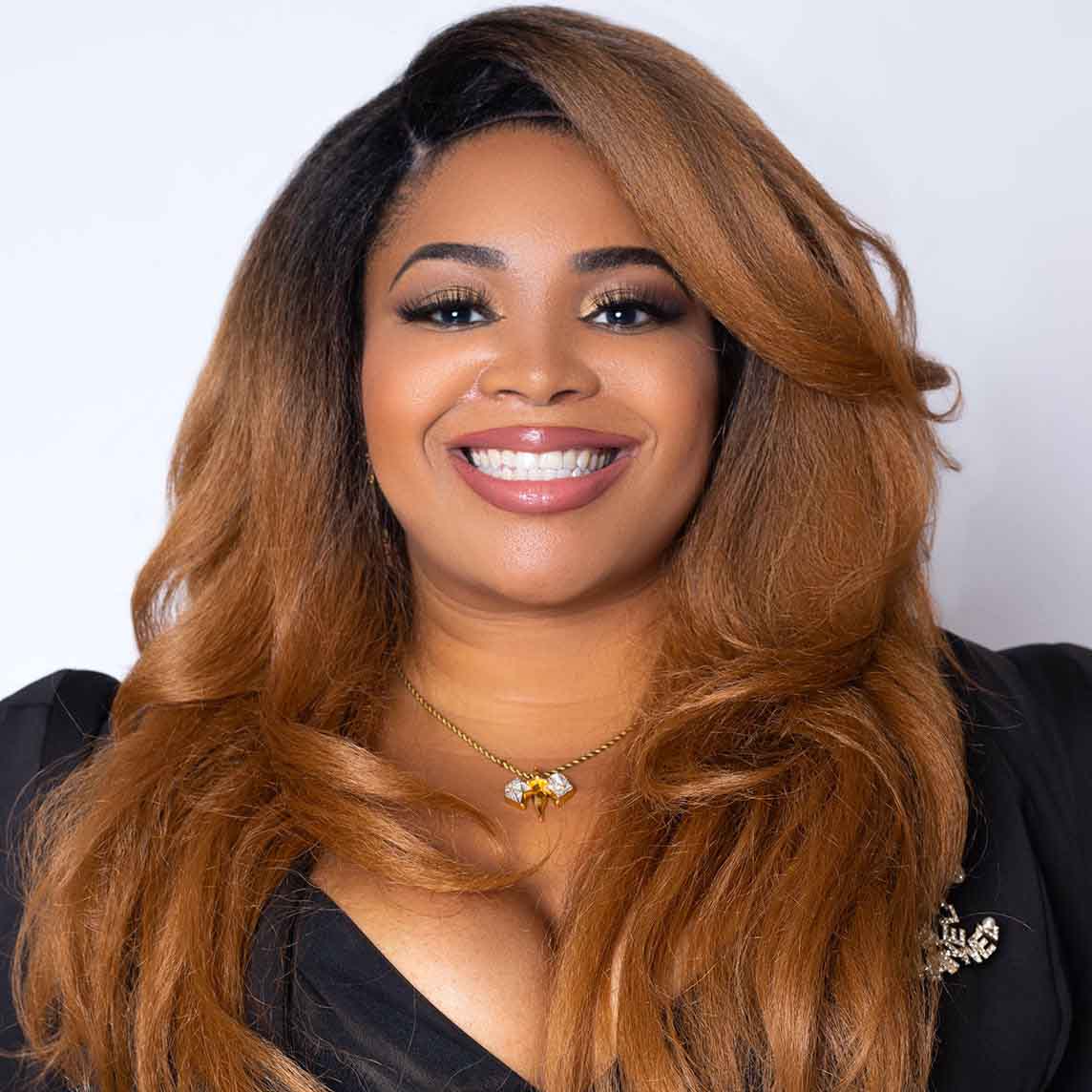 Ashley Ann, also known as King Ashley Ann, is a talented biz
builder, public speaker, social media strategist, and award-winning wedding and event designer.
Ashley currently travels the United States speaking to small business owners, side hustlers, wedding and
event industry professionals, and those who are thinking of starting a business. Ashley is equipped with
a B.A. in Finance and M.B.A. from the University of Central Arkansas. Ashley is a member of Sigma Gamma
Rho Sorority and an avid volunteer. She serves as a teen mentor, direct service volunteer and domestic
violence survivor. Ashley also instructs community financial literacy courses.
Ashley Ann has helped over 11,000 individuals monetize their social media and over 700 people create 6
figure incomes. She has currently helped 150 people create 7 figure incomes and 9 of her clients are
consistently doing million-dollar months. She has also helped over 1000 businesses generate $25K-
$45K per month using Facebook and Live Stream. Ashley Ann gives free business tips and strategy
classes on her Livestream Monday through Thursday.
Ashley’s is based in Little Rock, AR.. Ashley is known for her creative and unusual event ideas in the event
world. In the business world Ashley is known for getting results, and simplifying social media, lead
magnets, funnels, and CVO so that her clients achieve desired outcomes. She pays exquisite attention
to every last detail in the boardroom and in the ballroom.
Ashley Ann is a Google Partner, and has been featured in publications such as: Yahoo Finance, Yahoo
Life, CNN Money, Kontrol, MSN, Breitbart, NewBreak, Business Insider, Newsweek, CNBC, Sheen, Morning
Mix Up, Doz, Rolling Out Magazine, Fox News, KATV, WoW City, STAND’s 30 Under 30, and several other
media outlets and publications.
Ashley Ann, also known as King Ashley Ann, is a talented biz
builder, public speaker, social media strategist, and award-winning wedding and event designer.
Ashley currently travels the United States speaking to small business owners, side hustlers, wedding and
event industry professionals, and those who are thinking of starting a business. Ashley is equipped with
a B.A. in Finance and M.B.A. from the University of Central Arkansas. Ashley is a member of Sigma Gamma
Rho Sorority and an avid volunteer. She serves as a teen mentor, direct service volunteer and domestic
violence survivor. Ashley also instructs community financial literacy courses.
Ashley Ann has helped over 11,000 individuals monetize their social media and over 700 people create 6
figure incomes. She has currently helped 150 people create 7 figure incomes and 9 of her clients are
consistently doing million-dollar months. She has also helped over 1000 businesses generate $25K-
$45K per month using Facebook and Live Stream. Ashley Ann gives free business tips and strategy
classes on her Livestream Monday through Thursday.
Ashley’s is based in Little Rock, AR.. Ashley is known for her creative and unusual event ideas in the event
world. In the business world Ashley is known for getting results, and simplifying social media, lead
magnets, funnels, and CVO so that her clients achieve desired outcomes. She pays exquisite attention
to every last detail in the boardroom and in the ballroom.
Ashley Ann is a Google Partner, and has been featured in publications such as: Yahoo Finance, Yahoo
Life, CNN Money, Kontrol, MSN, Breitbart, NewBreak, Business Insider, Newsweek, CNBC, Sheen, Morning
Mix Up, Doz, Rolling Out Magazine, Fox News, KATV, WoW City, STAND’s 30 Under 30, and several other
media outlets and publications.
